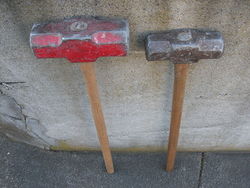UnBooks:A Year with the Rouge Tribe
Several years ago, I finished my studies on Anthropology. Freshly graduated, I was ready to see the world. I embarked on a voyage to document the strangest indigenous tribe the world has ever known, the Rouge Tribe. Here is my analysis and documentation of the infamous Rouge Tribe.
Background[edit | edit source]
As is commonly known, the Rouge Tribe is located in the most far-flung region of Wikiland, the Rogua Forest. The only information we know about the Rouge Tribe stems from the diary of the famous explorer Jon Awbrey, found drifting down the Rogua River:
As we traveled into the Rogua Forest, we were suddenly assailed by a most Savage tribe. They were armed with enormous Hammers and crude devices that reminded me of a mop. Although we fought back, they overwhelmed us with sheer numbres...Ten of us were cruelly massacred by those savages. They bound the rest of us, and only then was I able to take a look at them. They had blood smeared over their faces like as if the blood they wore was merely rouge...I am afraid it is curtains for us.[1]
The journey of Awbrey was met by immediate clamor, and the Rogua Forest became one of the most popular destinations for many more intrepid explorers, all of whom never came back, save one. The unfortunate man, whose name is lost to history, was beat so badly that he was immediately shot on the spot to prevent him from any more agony.
Although the skeptics claim that the Rouge Tribe does not exist and that the explorers died due to different circumstances, I found that this was not the case. I was of course very nervous about meeting such a barbaric tribe. When reading about each explorer, I found that it had been in their natures to carry a weapon with them and put up a fight. I then theorized that if I went weaponless, I might be able to be assimilated into the group.
I had heard exotic tales of their lifestyles, their strange garb and practices. One of the more colorful tales revolves around their hunting of an elusive creature, the Aypee, and of their weapon known as the "hammer of Bann." Whether these were true I would hopefully figure out.
First meeting[edit | edit source]

I came to the forest May 18, parachuted out along with my supplies to avoid danger to the plane and the pilot. Mercifully I managed to avoid the trees, which are spiky and poisonous, plunging into a pile of quicksand. It was only through assiduous struggle that I managed to extricate myself, and much of my supplies were lost. I walked along the river, hoping that I would find a Rouge man soon.
"Screw," someone grunted behind me. I turned around to see an enormous man, blood smeared all over his body, wearing nothing, holding an enormous hammer. I stepped back in fright and surprise, but the man had already flung me over his shoulder and was walking towards his tribe. By this time, I was so paralyzed in fright that I did not struggle. The forest started to thin until he was walking in a clearing. I saw many huts and a giant temple and many humans, all of them naked, smeared with blood, wielding hammers. He dragged me to a large hut, which I later found to be called the "Aniboard." I was sat down on a chair in the middle of the hut. All around me were the Rouge people, sitting in a circle around me. Here, I have translated their dialogue from Kabalish to English:
"I, JayZG, master of the Banhammer, general of a thousand wars, one of the high people of the Kabal, have brought this human before us, that we may decide his fate."
"Was he armed?" asked another.
"No, he had only a few surprises with him."
"We cannot let him go," said a Kabalist[2] whose name I later found to be Evoola, "Else the Vandal tribe take him and corrupt him."
"Then why don't we corrupt him? We need more Kabalists!" said a woman this time.
"They must prove themselves in the Arefay. And if he attempts to do it himself, it is a prima facie evidence of their power hunger!" said a smaller Kabalist with no hammer.
At this two or three men pounced upon him, throttling him and beating him with their fists.
"Silence!" shouted Posselthwait, a very fine specimen of a human, "We will conduct a straw poll on whether to accept this outsider into our ranks."
A general tumult now began, with some shouting that I should be accepted, some crying out for me to be sacrificed, other vociferously declaring their neutrality on the matter, and still others hollering that polls were evil.
"Stop!" shouted Posselthwait again, "We shall consult the God-King!"
He went and brought a large portrait of a bearded man, the God-King. Immediately all the Kabalists bowed and cried out to the God-King. All of a sudden, a deep voice from the heavens boomed and echoed: "He shall stay."
"The God-King has spoken!" chanted the natives in unison, "We shall keep him in our ranks!"
Daily Life[edit | edit source]
After the meeting in the Aniboard, I spent the next few weeks learning the Kabalish language, which I have detailed in Appendix I. Thankfully, it was quite easy to master. I was taught the tribal policies and learned more about their religion. Their religion is what I would like to focus on, for it seems that this governs daily life the most. It appears that the Kabalists believe that the God-King sent them down to create a kingdom. Most characteristic of the tribe is their crafts. They spend their whole time making shields of many different colors and shapes and designs and materials. Each one tells some bit of information which they can somehow interpret. The Kabalists work on all sorts of different shields, displayed outside, which they color and carve, or just maintain from the elements. Everyday, a new, finished shield is prominently displayed in the tribe's center as a work of art.
One day, I happened to see a terrible struggle over one of these shields. Two Kabalists were effacing each other's work on shield, which escalated to the point where they were having a fist fight. The shield was promptly put into a cage, padlocked, and the two combatants were sent to the Aniboard. Several hours later, the two came out, ushered by two Kabalists with the dreaded Banhammer. The two warrers were bound, placed on a stone slab, and then clubbed in the head, sending brains and blood flying. At this, the Kabalists with Banhammers went into a frenzy, smearing the blood all over themselves. This was not the first time I saw this, and indeed, some battles I beheld taking place for months on end. But in the end, someone was bound to get clubbed, and the Kabalists would be put into a bloody frenzy.
War[edit | edit source]

One night under a full moon, I was called over by the Kabalists.
"Come, we go to war against the Wheel Tribe!" said the person fetching me over.
"But I have no weapon," I replied.
"Rocks will be provided. Let's go!"
I went to the main gate of the tribe, took a sack of rocks, and ran with the Kabalists. The primitives ran, whooping and hollering. We ran all the way to another clearing where the Wheel Tribe was. The people, who balanced on wooden wheels, were taken by surprise. By this time, the Kabalists entered into a furious state of bloodlust. Us warriors with rocks were ordered to put up suppressive fire with our rocks while the Banhammer troops ran forth. I aimed a rock at an enemy warrior, knocking him off his wheel. Even before he hit the ground the Kabalists were on top of him, bashing him and spewing blood, gall, lymph, and organs everywhere. Finally, only the tribal shaman/chief and his guard were left. Not even the flaming wheels sent by the tribal shaman could stay the Kabalists, although many were burned, seared by the scorching flames. Finally, the shaman was captured and bound.
We marched back, signalling our approach with a victory call. We had about a dozen prisoners along with the shaman, who were led to the temple. Much like the pyramids of the Mayans, it had many steps, which they ascended until they reached the top. The first prisoner was laid on the slab, held down by four Kabalists. He was bashed everywhere by the Banhammer until he was nothing but a pile of red goop. This ritual continued with the other prisoners until they came to the shaman. They went over to the side and bound him to two large stone columns. A conch was blown, and the Kabalists ran up the steps with their Banhammers, surging forward, desperate to bash the shaman. The wave of hammers tore through the victim until nothing was left of him. The savages smeared the blood of the victim all over themselves, whooped wildly, and proceeded to have a ritual wild orgy. Disgusted by the sight, I vomited and went to sleep in my hut.
The Hunt[edit | edit source]
The next day did little to assuage my disgust at their bellicose ways. I was taken to my first hunt of the Aypee. I was handed a blowpipe and a lasso. I went out with a posse of Kabalists. They told me that the Aypee was actually a spirit that possessed animals. Some of them were helping spirits, but others were demons who were powerful enough to possess humans. As we were talking, a deer suddenly leapt out. It had great antlers, but we had no idea whether it was a demonic Aypee or not. Suddenly it charged at us. My companions raised their blowpipes and fired their darts. The deer was stunned and was promptly lassoed. We went back with our catch and brought it to a special hut, where a Kabalist with a Banhammer smashed its head. All of a sudden, we heard a shriek, and a dark figure left the carcass of the deer, fleeing into the forest. I was quite unnerved, but I said nothing and roasted the deer.
The Arefay[edit | edit source]
I had spent some seven months among the Kabal when one of them asked me whether I was intrepid enough to undergo an Arefay. The Arefay is one of the most grueling rituals among the cabal. The seven day ordeal is so intense that many do not survive. After accepting an Arefay, the person would be left with only their wits and a knife (if they were endowed with one). Their goal would be to survive for 7 days in the forest with traps and beasts everywhere, ready to tear them apart. The community's role in this entertainment would be to give them supplies and aid if they supported them, or to attack them if they did not. If they could survive for 7 days, then they were given the Hammer of Bann and given a prestigious rank, that of the Sissop.
I happened across an Arefay before, that of a Kabalist called Auxidain while walking through the forest. I had not intended to join the Arefay, but I came to a clearing and beheld a great clamor. Kabalists were in the typical blood rage, but this time attacking each other. I soon began to notice that there was a certain Kabalist in the center whom many others were protecting in a tight ring. There were no hammers or blades, but I could see that they pounded with their fists, kicked with their feet, and tore with their nails and teeth. In the end, the Kabalist in the center, Auxidain, was heavily wounded and conceded, giving up his ritual. I was told that some were like a civil war in the tribe, but usually the ritual was quiet and without much antagonism. Keeping the Auxidain affair in mind, I was quite apprehensive to go through mine.

